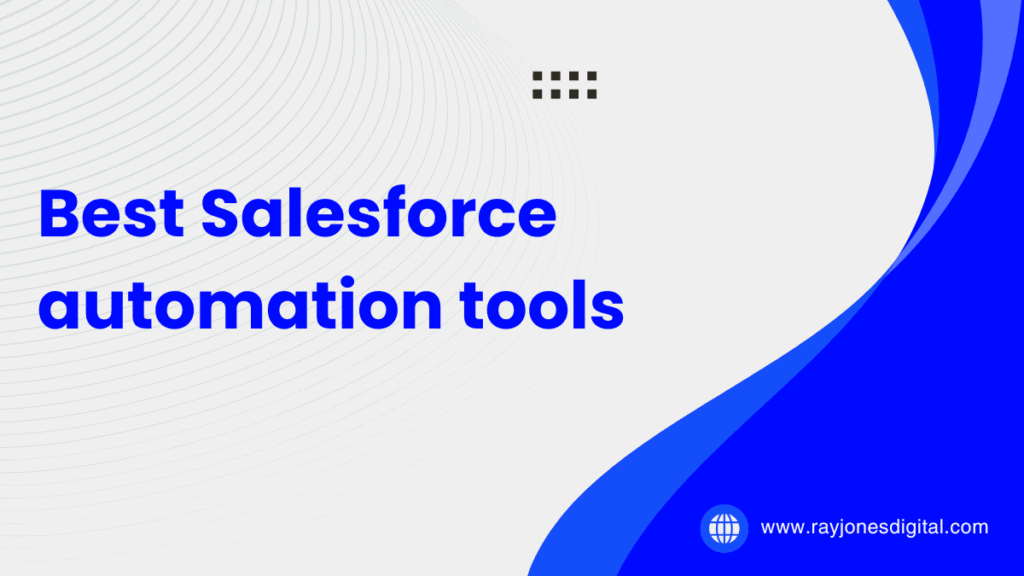
Sales teams face mounting pressure to convert leads faster while maintaining personalised customer relationships. The right Salesforce automation tools can transform how your team manages prospects, tracks opportunities, and closes deals.
This comprehensive guide explores the most effective Salesforce automation tools available, helping you build a sales ecosystem that maximises both productivity and revenue. You’ll discover tools that streamline your sales process, automate repetitive tasks, and provide insights that drive better decision-making.
What Makes a Salesforce Automation Tool Truly Valuable?
The most effective Salesforce automation tools share several essential characteristics that separate them from basic CRM add-ons and simple utilities.
Seamless Native Integration
Quality automation tools integrate deeply with Salesforce’s architecture. This native integration ensures data flows smoothly between systems without creating sync issues or duplicate records that plague third-party solutions.
Intelligent Workflow Automation
The best tools understand your sales process context and automate actions based on meaningful triggers. Rather than simple if-then rules, these solutions adapt to complex sales scenarios and customer behaviours.
Scalable Performance
When handling thousands of leads or managing enterprise-level sales volumes, your automation tools need to maintain responsiveness. Effective solutions handle heavy workloads without slowing down your sales team’s daily operations.
Customisation Without Complexity
Every sales team has unique processes and requirements. The most valuable tools offer extensive customisation options that adapt to your specific needs without requiring extensive technical knowledge.
Essential Lead Management and Prospecting Tools
Salesforce Sales Cloud Einstein
Sales Cloud Einstein transforms your CRM data into actionable insights through artificial intelligence. This native Salesforce solution provides predictive analytics and automated recommendations that guide sales decisions.
Key Features:
- Lead scoring based on historical conversion data
- Opportunity insights and win probability predictions
- Activity timeline recommendations
- Automated data capture from emails and meetings
- Predictive forecasting with confidence intervals
Why Sales Teams Choose Einstein:
The AI analyses your existing Salesforce data to identify patterns humans might miss. Its predictions become more accurate over time as it learns from your team’s successes and failures.
Best For: Established sales teams with substantial historical data seeking to optimise their existing processes through AI-driven insights.
Outreach.io
Outreach revolutionises sales engagement through sophisticated sequence automation and performance analytics. This platform excels at managing complex, multi-touch campaigns across various communication channels.
Key Features:
- Multi-channel sequence automation (email, phone, social)
- A/B testing for outreach templates and timing
- Advanced analytics and performance tracking
- Team collaboration and template sharing
- Integration with popular sales tools and CRMs
Why Sales Teams Choose Outreach:
The platform’s ability to maintain personalised communication at scale transforms how teams approach prospecting. Its analytics help identify which approaches work best for different prospect types.
Best For: Sales development teams and inside sales organisations requiring sophisticated outreach automation and detailed performance analytics.
ZoomInfo
ZoomInfo provides comprehensive B2B contact and company intelligence that powers effective prospecting. This platform combines accurate data with intent signals to identify high-value prospects.
Key Features:
- Extensive B2B contact and company database
- Intent data showing prospect buying signals
- Technographics and firmographics intelligence
- Real-time alerts for prospect changes
- Chrome extension for instant contact enrichment
Why Sales Teams Choose ZoomInfo:
The platform’s data accuracy and depth enable more targeted prospecting efforts. Its intent data helps sales teams prioritise prospects showing active buying signals.
Best For: B2B sales teams focusing on outbound prospecting and account-based sales strategies requiring detailed prospect intelligence.
Pipeline Management and Opportunity Tracking
Salesforce CPQ (Configure, Price, Quote)
Salesforce CPQ streamlines the quote-to-cash process by automating complex pricing calculations and proposal generation. This tool eliminates manual errors and accelerates deal closure.
Key Features:
- Automated pricing and discount calculations
- Guided selling with product recommendations
- Professional quote and proposal generation
- Approval workflow automation
- Integration with billing and contract management
Why Sales Teams Choose CPQ:
The tool transforms complex pricing scenarios into simple, guided processes. Sales reps can generate accurate quotes quickly without extensive product knowledge or pricing training.
Best For: B2B sales teams selling complex products or services with variable pricing, multiple SKUs, or customised solutions.
Gong.io
Gong analyses sales conversations to provide insights that improve deal outcomes. This conversation intelligence platform captures and analyses every customer interaction to identify winning behaviours.
Key Features:
- Automatic call recording and transcription
- Conversation analytics and topic tracking
- Competitive intelligence from customer calls
- Deal risk assessment and coaching insights
- Team performance benchmarking
Why Sales Teams Choose Gong:
The platform reveals what actually happens in sales conversations versus what reps think happened. Its insights help managers coach more effectively and reps replicate successful approaches.
Best For: Sales teams conducting regular phone or video calls with prospects, particularly those focused on consultative selling approaches.
Pipedrive
Pipedrive offers visual pipeline management that makes deal tracking intuitive and actionable. This CRM focuses on simplicity while providing powerful automation features.
Key Features:
- Visual pipeline management with drag-and-drop functionality
- Activity-based selling methodology
- Email integration and template automation
- Goal setting and progress tracking
- Mobile app for on-the-go access
Why Sales Teams Choose Pipedrive:
The platform’s visual approach makes pipeline management feel natural and engaging. Its focus on activities rather than just deal stages helps teams maintain momentum.
Best For: Small to medium-sized sales teams seeking an intuitive CRM that emphasises activity-driven selling processes.
Email and Communication Automation
Salesforce Pardot
Pardot provides sophisticated marketing automation that nurtures leads through the entire sales funnel. This platform excels at bridging marketing and sales activities within the Salesforce ecosystem.
Key Features:
- Lead nurturing campaigns with dynamic content
- Lead scoring and grading automation
- Landing page and form creation
- Email marketing with advanced segmentation
- ROI reporting and attribution tracking
Why Sales Teams Choose Pardot:
The platform’s tight integration with Salesforce ensures marketing and sales work from the same data. Its lead nurturing capabilities warm prospects before they reach sales reps.
Best For: B2B organisations with longer sales cycles requiring sophisticated lead nurturing and marketing automation capabilities.
Mixmax
Mixmax enhances email productivity through advanced tracking, scheduling, and template features. This Gmail and Outlook extension brings CRM-level functionality to standard email clients.
Key Features:
- Email tracking and engagement analytics
- Calendar scheduling links and availability
- Email templates with personalisation tokens
- Sequence automation for follow-ups
- Integration with popular CRM systems
Why Sales Teams Choose Mixmax:
The tool transforms standard email into a powerful sales communication platform. Its scheduling features eliminate the back-and-forth typically required to book meetings.
Best For: Sales professionals who primarily use email for prospect communication and need enhanced tracking and scheduling capabilities.
Salesloft
Salesloft provides a comprehensive sales engagement platform that combines prospecting, email automation, and call management. This solution excels at managing complex sales processes across multiple channels.
Key Features:
- Multi-touch cadence creation and management
- Email tracking and template optimisation
- Built-in dialer with local presence
- Meeting scheduling and calendar integration
- Advanced analytics and reporting
Why Sales Teams Choose Salesloft:
The platform’s cadence functionality ensures consistent follow-up across all prospects. Its analytics help teams identify which approaches generate the best results.
Best For: Sales teams requiring sophisticated multi-channel outreach capabilities with detailed performance tracking and optimisation features.
Data Management and Analytics
Salesforce Analytics Cloud (Tableau CRM)
Analytics Cloud transforms Salesforce data into actionable insights through advanced visualisation and predictive analytics. This platform helps sales teams understand performance patterns and optimise strategies.
Key Features:
- Interactive dashboards and visualisations
- Predictive analytics and forecasting
- Mobile-first design for on-the-go access
- AI-powered insights and recommendations
- Custom app creation for specific use cases
Why Sales Teams Choose Analytics Cloud:
The platform’s AI capabilities surface insights that might otherwise remain hidden in CRM data. Its mobile-first approach ensures insights are accessible anywhere.
Best For: Sales organisations requiring advanced analytics capabilities and custom reporting beyond standard Salesforce reports and dashboards.
Chorus.ai
Chorus analyses sales conversations to provide coaching insights and deal intelligence. This conversation analytics platform helps sales teams understand what drives successful outcomes.
Key Features:
- Automatic call recording and analysis
- Keyword and topic tracking
- Competitive intelligence extraction
- Deal risk assessment
- Team performance comparison
Why Sales Teams Choose Chorus:
The platform reveals conversation patterns that correlate with successful deals. Its coaching insights help managers improve team performance systematically.
Best For: Sales teams conducting regular prospect calls who want to improve conversation quality and deal outcomes through data-driven insights.
InsightSquared
InsightSquared provides revenue intelligence that combines CRM data with advanced analytics. This platform helps sales teams forecast accurately and identify pipeline risks.
Key Features:
- Revenue forecasting with confidence intervals
- Pipeline analysis and risk assessment
- Sales performance benchmarking
- Activity correlation with outcomes
- Custom reporting and dashboards
Why Sales Teams Choose InsightSquared:
The platform’s revenue intelligence helps sales leaders make data-driven decisions about resource allocation and strategy. Its forecasting accuracy improves over time.
Best For: Sales organisations requiring sophisticated revenue analytics and forecasting capabilities beyond standard CRM reporting.
Task and Activity Automation
Salesforce Flow
Salesforce Flow provides powerful workflow automation that can handle complex business processes. This native platform tool automates routine tasks and ensures consistent process execution.
Key Features:
- Visual workflow designer
- Complex logic and decision branching
- Integration with external systems
- Scheduled and triggered automation
- User interface creation for guided processes
Why Sales Teams Choose Flow:
The platform’s visual approach makes complex automation accessible to non-technical users. Its flexibility handles unique business requirements that standard automation can’t address.
Best For: Sales teams requiring custom automation that goes beyond standard workflow rules and process builder capabilities.
Zapier
Zapier connects Salesforce with thousands of other applications through simple automation rules. This platform enables sales teams to automate tasks across their entire tech stack.
Key Features:
- Connections between 3,000+ applications
- Simple trigger-action automation setup
- Multi-step workflow creation
- Data transformation and filtering
- Error handling and monitoring
Why Sales Teams Choose Zapier:
The platform’s extensive app ecosystem enables automation across tools that don’t natively integrate. Its simple interface makes automation accessible to non-technical team members.
Best For: Sales teams using multiple tools who need simple automation to connect systems and reduce manual data entry.
Calendly
Calendly’s Salesforce integration automates meeting scheduling and follow-up processes. The tool automatically creates Salesforce events, updates lead records, and triggers email sequences based on meeting outcomes.
Its automated reminder system reduces no-shows whilst ensuring all meeting details sync properly with Salesforce. Sales teams report significant time savings and improved meeting attendance rates.
Data Management and Enrichment Tools
ZoomInfo
ZoomInfo enhances Salesforce records with comprehensive contact and company information. The tool automatically updates outdated records, fills in missing data fields, and identifies new prospects within target accounts.
Its real-time data verification ensures sales teams always have accurate contact information. The platform’s intent data features also alert teams when prospects are actively researching solutions, creating timely outreach opportunities.
Clearbit
Clearbit automatically enriches Salesforce leads and contacts with detailed company and personal information. The tool populates records with job titles, company size, technology usage, and social media profiles.
This enrichment happens automatically as leads enter your system, ensuring sales reps have comprehensive prospect information before their first outreach attempt. Better data quality leads to more personalised conversations and higher conversion rates.
Data.com (Salesforce Data)
Salesforce’s native data enrichment service automatically maintains clean, up-to-date records within your CRM. The tool identifies duplicate records, standardises data formats, and appends missing information.
Regular data cleaning processes ensure your team works with accurate information whilst duplicate detection prevents confusion and wasted effort. Clean data improves reporting accuracy and campaign effectiveness.
Choosing the Right Automation Tools for Your Team
Selecting appropriate automation tools depends on your team’s specific needs, technical capabilities, and budget constraints. Start by identifying your biggest pain points and time-consuming manual processes.
Consider your team’s technical expertise when evaluating tools. Some platforms require significant setup and configuration, whilst others offer plug-and-play functionality. Factor in training requirements and ongoing maintenance needs.
Integration capabilities matter significantly. Choose tools that work seamlessly with your existing Salesforce configuration and other business applications. Native Salesforce applications often provide the smoothest integration experience.
Implementation Best Practices
Successful automation implementation requires careful planning and gradual rollout. Start with one or two tools rather than attempting to automate everything simultaneously. This approach allows teams to adapt gradually and identify what works best.
Involve your sales team in the selection process. Tools that seem powerful on paper may not align with your team’s actual workflow. Conduct pilot programmes with key team members before full deployment.
Establish clear metrics for measuring automation success. Track improvements in productivity, lead conversion rates, and revenue generation. Regular performance reviews help identify areas for optimisation and additional automation opportunities.
Maximising Your Sales Automation Investment
The most successful sales automation implementations combine powerful tools with proper training and ongoing optimisation. These Salesforce automation tools can transform your sales process, but success depends on thoughtful selection and implementation.
Start by evaluating your current sales process and identifying automation opportunities. Choose tools that align with your team’s needs and technical capabilities. Remember that automation should enhance human capabilities rather than replace relationship-building skills.

I am Ray Jones Digital
My current occupations: a Digital Marketer, Local SEO expert, Link Builder, and WordPress SEO specialist. Shopify SEO, Ecommerce Store Management, and HTML & WordPress Developer I have been practicing the above mentioned services for more than 10 years now As an SEO expert working with your ongoing projects.



